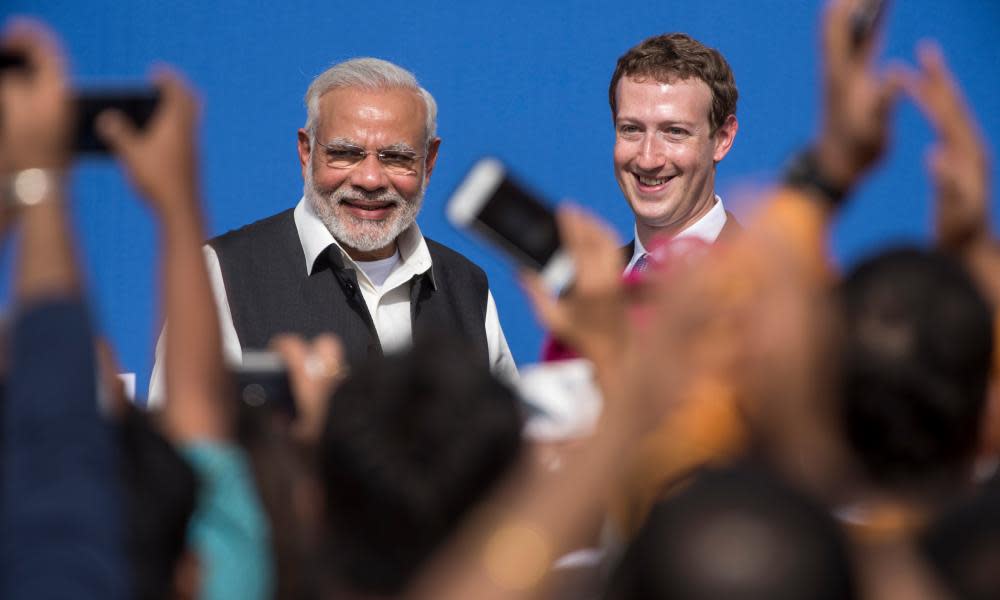Tech giants are happy to do Modi’s bidding in return for access to the Indian market

For decades, India was a poster child for democratic development: a poor, sprawling, ethnically diverse country that nevertheless had regular elections and peaceful transfers of power – the hallmarks of a functioning democracy – albeit with the flaws inherent in such a system, including a single dominant party – the Congress party. And then, in May 2014, Narendra Modi, leader of the BJP, was elected, swept to power on a standard-issue neoliberal platform of modernisation, privatisation and liberalisation of the economy, slashing welfare budgets, lowering corporate taxes, abolishing wealth taxes, etc.
Modi’s election, wrote the august journal Foreign Policy, marked a critical milestone in his country’s development. He was “the first leader since independence to command a lower-house parliamentary majority that did not belong to the Congress party of India’s founders Mohandas Gandhi and Jawaharlal Nehru. After 65 years, a dynastic founding party was subsumed by new blood.” But in the six years since his first election (he was re-elected in 2019), the journal continued, “it has become clear that his style of leadership poses an existential threat to the world’s largest democracy. Through his wildly successful promotion of Hindutva ideology, Modi is poised to remake India into a Russian-style ‘managed democracy’ – one retaining all the trappings of democracy while operating as a de facto autocracy.”
Quite like Hungary, in fact. Looking at his record, Modi seems to have been following the playbook of Viktor Orbán, that country’s prime minister, except that Modi has added religious and ethnic dimensions to his programme. But the formula seems pretty similar, based as it is on a thumping electoral majority and weak parliamentary opposition. The formula is to promise economic reform and then, when that falters, suppress opposition, control mainstream – and then social – media and undermine the judicial system. To this Modi has added his own distinctive flourish: radical and sustained use of internet shutdowns to hamper the mobilisation of opposition. And, so far, the strategy seems to be working: last year, Freedom House, an organisation that continually monitors the health of democracies, had judged India to be a “free” society. This year, the country’s rating is “partly free”.
Related: Facebook planned to remove fake accounts in India – until it realized a BJP politician was involved
All of which impales American tech giants, especially Amazon, Facebook, Google and Netflix, on the horns of an ethical dilemma. For them, India represents a huge market – bigger than China, in a way, because of the firm grip that the Communist party has on the operations of tech companies in its jurisdiction. The Indian market, being less centrally controlled, has enormous potential for growth. But in order to thrive there the companies must reach an accommodation with an authoritarian government that doesn’t brook criticism, never mind opposition.
In February, Modi’s administration announced sweeping new rules to regulate social media firms, streaming services and digital news outlets. Companies will be required to acknowledge takedown requests of unlawful and violent content and misinformation within 24 hours and deliver complete redress within 15 days. In sensitive cases such as those surrounding explicit sexual content, firms will be required to take down the content within 24 hours and will also be required to appoint compliance, contact and resident grievance officers whose names and contact details will be shared with New Delhi to address official concerns. Each will also be required to set up a local office in India, which means they will have employees on the ground who can be arrested and jailed.
For Facebook, with its long history of accommodating tyrants, this shouldn’t be too much of a problem. A recently revealed internal memo released by Sophie Zhang, a former employee who was a data scientist on the company’s “site integrity fake engagement” team, reveals how relaxed Facebook was about the activities of supporters of Donald Trump and foreign autocrats from Honduras, Azerbaijan and Ukraine on its platform. Zhang also observed “a lack of desire from senior leadership to protect democratic processes in smaller countries”. So Facebook’s boss and India’s prime minister will doubtless get along fine. After all, they’re both autocrats.
Twitter, for its part, had a brief flirtation with defiance of the ruling regime. But in the end it seems to have bowed to the facts on the ground. At any rate, after it was pulled up by the government for non-compliance, the company blocked 1,398 of 1,435 accounts that had been flagged by the IT ministry for allegedly spreading misinformation about the farmers’ protests that had been enraging the government.
In the end, of course, all of the US tech companies agree with Donald Trump on one thing at least: principles are for losers.
What I’ve been reading
Climate clash
A truly remarkable and far-sighted essay by Helen Thompson on the Engelsberg Ideas site looks at the coming geopolitical fight over sustainable energy between China, the US and Europe.
You dirty rat
Put away the bleach: you can stop playing in the hygiene theatre. A terrific essay by Derek Thompson in the Atlantic on why you shouldn’t be obsessive about cleaning surfaces.
Cruise control
A salutary piece by Zeynep Tufekci on her Substack blog on what we failed (refused?) to learn from the Diamond Princess cruise liner.

 Yahoo Movies
Yahoo Movies 
